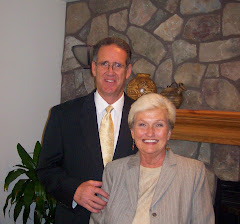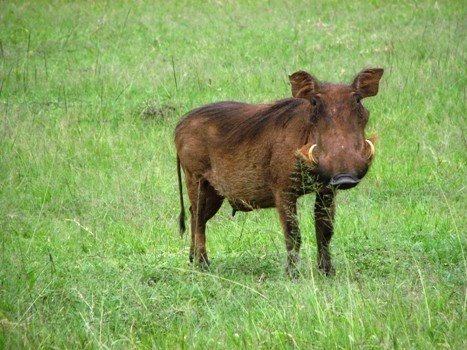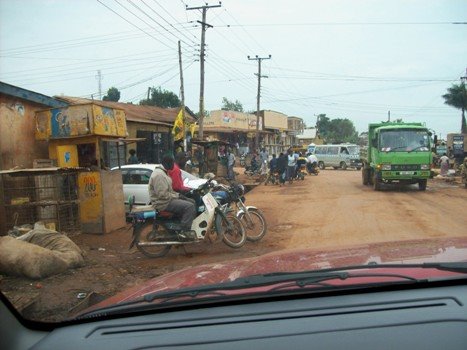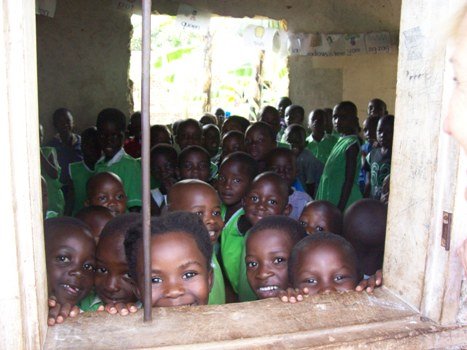Map of Uganda
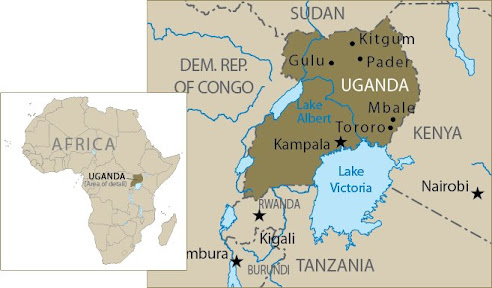
The Uganda Kampala Mission includes Uganda, Ethiopia, Rwanda, Burundi and Southern Sudan. Our assignment covers all the areas except Ethiopia.
Sunday, November 30, 2008
Sunday, November 16, 2008
Trip to Congolese refugee camp to..."Reduce pain and deliver hope".

On Wednesday, November 10th we were contacted by Uganda's Minister of State for Relief & Disaster Preparedness & Refugees requesting the Church's help with the refugees fleeing into Uganda from the war in the DR Congo. They are being sheltered in a camp in the Naki Valley near Mbarara, Uganda. As the rainy season is approaching, the nights here are in the 60's and there are many children and infants in the camp. We contacted the Area office in Johannesburgh, South Africa to see if we could avoid the delay and costs of shipping items from Salt Lake City by purchasing them locally. With the help of a local member, Ssimbwa Busulwa Kakinda, we have secured 1,920 blankets, 2,200 lbs. of powdered milk and 800 cooking pots. We rented a truck and and delivered the supplies to the camp Wednesday, November 17th.
For easier viewing, click on any picture to enlarge.
For easier viewing, click on any picture to enlarge.


We were accompanied by Musa Ecweru, Uganda’s Minister of State for Refugees. He is a good, kind man who says what he does is not a job but a calling which comes from the heart. When introducing us to speak to the refugees he said, “The purpose of humanitarian service is to reduce pain and deliver hope. The LDS Church works quietly, without need for publicity, to help the Ugandan people who are in need”; a great statement of our purpose here.

Many other agencies were in the camp doing their first assessment of needs. The Church was able to have the supplies in the camp within 6 days of the request from the Minister of State. This would not have been possible without the help of a local member, Ssimbwa Busulwa Kakinda, who assists us as a monitor on Humanitarian projects. He is an incredible resource and can locate almost anything. He is the chief of a local tribe in the Mpigi District.
Tuesday, November 11, 2008
LDS Church to aid Congolese refugees

On Wednesday, November 10th we were contacted by Uganda's Minister of State for Relief & Disaster Preparedness & Refugees requesting the Church's help with the refugees fleeing into Uganda from the war in the DR Congo. They are being sheltered in a camp in the Naki Valley near Mbarara, Uganda. As the rainy season is approaching, the nights here are in the 60's and there are many children and infants in the camp. We contacted the Area office in Johannesburgh, South Africa to see if we could avoid the delay and costs of shipping items from Salt Lake City by purchasing them locally. With the help of a local member, Ssimbwa Busulwa Kakinda, we have secured 1800 blankets, 2200 lbs. of powdered milk and 800 cooking pots. We have rented a truck and will load tomorrow and deliver the supplies to the camp this Wednesday. The Minister and U.N. officials will fly by helicopter from Kampala and meet us there for the distribution. We will post pictures of the camp when we return.
Plight of the orphans in Uganda

There are an incredible number of orphans in Uganda resulting from both the rebel activity in the north and the effects of HIV/AIDS. They reside either in orphanages or with relatives or other kind people who have just taken them in. It is not unusual to see families caring for 8-10 children. The Ugandans are a very kind and tender-hearted people but providing for all of the needs of the children is sometimes beyond their reach. We are looking for ways to assist start up schools and community based organizations who are trying to address this problem.
Tuesday, November 4, 2008
"Well adjusted" to life in Africa?


On Saturday, driving home from the village of Mengo we noticed that we had a bodabod on each side of the truck, within 2", there was a goat in the road and two cars were coming toward us head-on....and it really didn't seem that unusual. Does that mean that we have adjusted to driving in Uganda? We have still tried to avoid driving after dark. There are people everywhere walking in the road wearing dark clothes. The rainy season is just beginning and it reminds us of Louisiana rain. A torrential rain will start and the roads will be running with water in a matter of minutes. We have a balcony in our apartment and love to sit out and watch the rains. There are all kind of exotic trees and during a storm it looks like "The Land of the Lost" outside.
We have a hand-over project Friday at a school where the Church has supplied 15 sewing machines. Employment opportunities are limited here and the school uses the machines to teach the students a useful skill that may provide opportunity later in life. Just before the Beans left to return to the U.S. we had a hand-over in the Nile Valley with seven villages who were given cattle, goats and pigs to help sustain them. We partnered with an organization that works with women and families impacted by HIV/AIDS, which is still a massive health issue in Uganda. The villages are supplied with pregnant animals. When the young are born they are then given to one of the other villages to repeat the process.

Every Wednesday we meet with organizations which bring us project proposals for our consideration. We then go through them to decide which ones are sustainable and will impact the most people. It is difficult to have to decide who we can and can't help because the needs are so great here. The projects are going forward in Rwanda and the Sudan and there are 9 open projects in Uganda which are in various stage of completion. We are now going through all of the proposals to identify new ones to start in January. The large Mpigi water and sanitation project is in the final planing stage and we are trying to resolve some stumbling blocks with the local water district. Hopefully the rehabilitation of the old wells and drilling of the new will start within the next two weeks.
We met yesterday with a little six year old girl who had both of her legs amputated below the knees due to complications from measles. We fitted her with a wheel chair provided by the Church. The effect of measles among the Africans is quite different than what we are used to. Most of them have not been vaccinated and 1 out of 4 here die from complications of measles. It is still the largest cause of blindness in Africa. Since being here we have really come to appreciate how blessed we are in our own lives and how truly unique our living circumstances are in the United States compared to much of the rest of the world. We have also reflected on our freedom and political system of government as voting for the President occurs tomorrow. Different factions here are already talking about stock piling weapons in anticipation of their Presidential election in 2011. Even in a hard fought campaign, that thought process does not take place in America.
We have a hand-over project Friday at a school where the Church has supplied 15 sewing machines. Employment opportunities are limited here and the school uses the machines to teach the students a useful skill that may provide opportunity later in life. Just before the Beans left to return to the U.S. we had a hand-over in the Nile Valley with seven villages who were given cattle, goats and pigs to help sustain them. We partnered with an organization that works with women and families impacted by HIV/AIDS, which is still a massive health issue in Uganda. The villages are supplied with pregnant animals. When the young are born they are then given to one of the other villages to repeat the process.

Every Wednesday we meet with organizations which bring us project proposals for our consideration. We then go through them to decide which ones are sustainable and will impact the most people. It is difficult to have to decide who we can and can't help because the needs are so great here. The projects are going forward in Rwanda and the Sudan and there are 9 open projects in Uganda which are in various stage of completion. We are now going through all of the proposals to identify new ones to start in January. The large Mpigi water and sanitation project is in the final planing stage and we are trying to resolve some stumbling blocks with the local water district. Hopefully the rehabilitation of the old wells and drilling of the new will start within the next two weeks.
We met yesterday with a little six year old girl who had both of her legs amputated below the knees due to complications from measles. We fitted her with a wheel chair provided by the Church. The effect of measles among the Africans is quite different than what we are used to. Most of them have not been vaccinated and 1 out of 4 here die from complications of measles. It is still the largest cause of blindness in Africa. Since being here we have really come to appreciate how blessed we are in our own lives and how truly unique our living circumstances are in the United States compared to much of the rest of the world. We have also reflected on our freedom and political system of government as voting for the President occurs tomorrow. Different factions here are already talking about stock piling weapons in anticipation of their Presidential election in 2011. Even in a hard fought campaign, that thought process does not take place in America.
Subscribe to:
Comments (Atom)
"Everything must have a beginning"
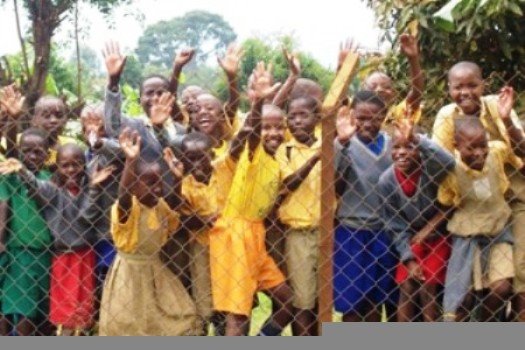
Children at an orphanage in Entebbe, Uganda. There are so many children here it is incredible; there are orphans everywhere. The people take them in and it is not unusual to see families struggling with 8-10 children. We talked to a woman yesterday who has taken in twelve children. She said, "sometimes I feel sad that I cannot do more, but everything must have a beginning". We have decided to use that as our personal reminder to guide our actions here as we try to help.











.jpg)






